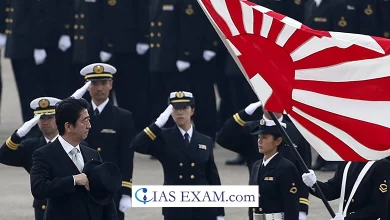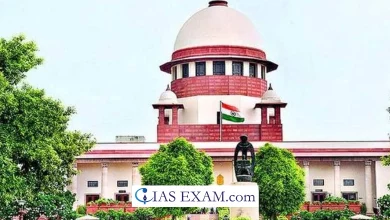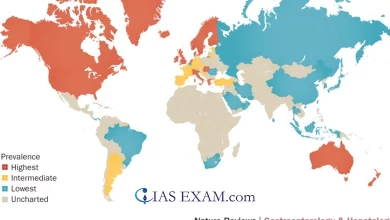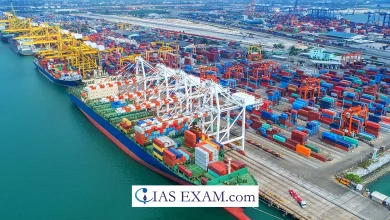Daily Current Affairs for UPSC
Preventing China-Taiwan Tensions
Syllabus: International Relations [GS Paper -2 ]
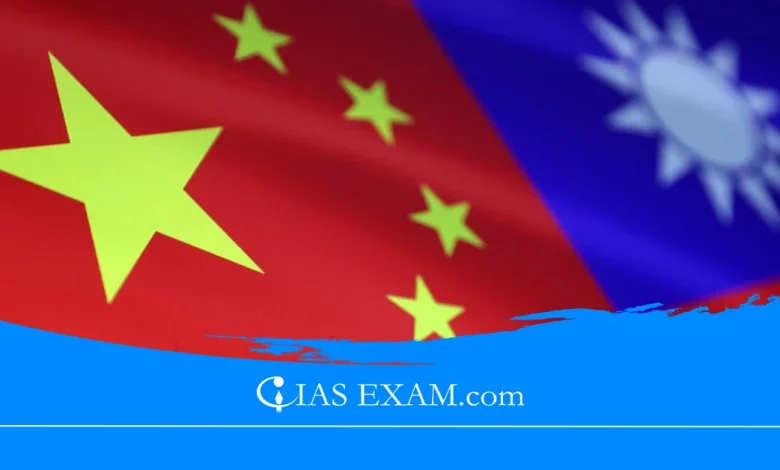
Context
- Ideally, India shall implement stronger policies to safeguard its interests as well since it is nowadays embroiled in diverse and contradictory conflicts and disputes like that in Taiwan.
- India better become stricter and full of precautionary measures as the country now is receiving more and more implication as it is joining multi-regional security interventions within distant areas such as Taiwan.
About China – Taiwan Tensions
- The historical obstacles for China and Taiwan revolve around the delicate relationship between the People’s Republic of China (PRC) and Republic of China (ROC), two different states which claim legitimacy and sovereignty over the island. This issue represents a very complex historical, political, and cultural situation.
- The tension between Taiwan and China may be traced back through to the victory of the Communist Party of China in the year 1949, consequently the Chinese Civil War. This eventually carried to the foundations of the People’s Republic of China, but after the defeat of Kuomintang, they retreated to Taiwan and continued to control the Republic of China. However, though both regimes believe in their rightfulness to govern over China, they are the outcomes of two political jurisdictions with unique political elements.
- For a number of years, the Tai-wan and Cha-nin did not accept the existence of each other and also did not recognize themselves as legitimate entities. Nevertheless, Taiwan’s recent economic expansion and shift towards democracy which began in the 1980s boosted its worldwide esteem and its identification became unique.
- China has consistently throughout the message into the world and declared that Taiwan is part of its territory and has been trying to drag other countries and international organisations to sever the sometimes covert ties with Taiwan.
- The tension in China and Taiwan is more developing compared to the past, and some factors are also involved.
- With the development of the military in China, especially the navy and missiles, alarm bells began ringing not only in Taiwan, but also its allies. They got increasingly worried about Taiwan’s independence as China’s influence was growing.
- On the other hand, China is striving harder to cut off Taiwan diplomatically by tricking rival countries and putting internal stress on companies and organisations to stick with its One-China policy.
- In spite of that excessive pressure from China, the democratic government of Taiwan has been conducting efforts at building its position in global business, arts and culture. It seems disagreeable by China as this acts as a life-saver for the stability of their sovereignty.
- China and Taiwan’s relationship was damaged then exacerbated by the election of Tsai Ing-wen. The party which Tai is aimed at is also viewed as making a move for independence, and this has raised the tensions between both sides.
Root Cause to Prevent China – Taiwan Conflict
- India has a very solid and legitimate reason to support the status quo concerning Taiwan, this is because economics and strategy are very crucial to India on this point.
- The developing trade relations and possible collaborations in sectors such as abroad – indication of something outside the context – the semiconductor manufacturing as a key factor in India’s economic development and strategic security calls for a peaceful environment across the Taiwan Strait.
- An action against Taiwan including any military operation would greatly influence the economy of India while disarming the whole regional economic progress. This enters into the centre of the globe trade and supply chain of industries which is very fragile at this moment.
- Moreover, the conflict on Taiwan might expand tensions in the Indo-Pacific region, which can have an impact on the Indo-China relations, as well as the regional security dynamics, and will affect the chances of nuclear escalation and the rebuilding of the regional security architecture.
- Along with deterrence mechanisms, India can employ negotiations to distract China from war and craft messages based on international law, and coordinate on the message by diplomacy.
- Through economic de-risking programs and countering the Chinese with information operations, the Taiwanese can be provided with the needed support that can discourage the Chinese to stay passive.
- Furthermore, sending military support to the U.S. troops in the Indian Ocean will raise deterrence ability, and thus, strengthen India’s promise to a peaceful region.
- Besides that this policy package prevents Taiwan conflict but, additionally, appears consistent with India’s wider strategies such as, for example, deepening friendship with the U.S. and participation in the Global South for purposes of our growing up and people in harmony.
Conclusion
- In sum-up, India finds the previous status quo in the Taiwan Strait according to its strategic interests.
- Trade dependability, stability in the region, and treaty-based relations form routes to get from the precipice of war.
- This policy invariably grants India the leverage of exploring balanced and harmonised integration in the Indo-Pacific region, which further promotes international partnerships and assures regional peace.
Source: The Hindu
UPSC Mains Practice Question
Q.Discuss the implications of the ongoing tensions between China and Taiwan for India’s foreign policy and regional security dynamics. How can India strategically align its interests to prevent conflict in the Taiwan Strait while fostering stability in the Indo-Pacific region?





.png)
